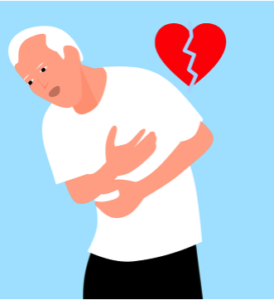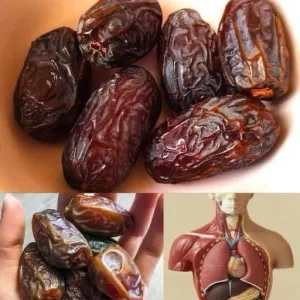Heart attacks have become increasingly common globally, standing as the leading cause of death. Lifestyle changes, such as adopting a healthy diet and managing stress, play a crucial role in safeguarding cardiovascular health.
Recognizing symptoms of heart failure is equally important, often manifesting a month before a potential heart attack:
1. **Insufficiency of Oxygen:**
Difficulty breathing indicates insufficient oxygen reaching the lungs, affecting heart function. Immediate medical attention is necessary for persistent breathing issues.
2. **Cold and Flu Symptoms:**
Symptoms like those of a cold or flu can precede a heart attack, requiring attention, especially if they appear unexpectedly.
3. **Pressure in the Chest:**
Chest pressure is a clear indication of an impending heart attack. Consult a doctor promptly if chest pain occurs.
4. **Deficiency:**
Constricted arteries restrict blood flow, depriving muscles of necessary nutrients, potentially leading to heart failure. Persistent tiredness and weakness warrant a doctor’s evaluation.
5. **Dizziness and Cold Sweats:**
Poor circulation obstructs blood flow to the brain, causing dizziness and cold sweats. These symptoms demand prompt attention.
6. **Persistent Tiredness:**
Lingering weariness despite adequate rest may signify blood flow issues to the heart, requiring medical assessment.
Heart attack prevention is paramount, and early recognition and treatment of these symptoms significantly reduce the risk. A heart attack occurs when blood flow to the heart is obstructed, often by plaque buildup in the coronary arteries. Immediate medical assistance is crucial in suspected heart attack cases.

Promoting a heart-healthy lifestyle involves balanced nutrition and stress management. Recognizing the urgency of symptoms and seeking timely medical attention are vital in preventing and addressing heart attacks.
**Causes of Heart Attacks:**
Heart attacks result from the blockage of one or more coronary arteries. Atherosclerosis, the buildup of fatty deposits, is a common cause, leading to plaque formation and artery narrowing. The plaque can rupture, causing a blood clot that obstructs blood flow, potentially damaging the heart muscle.
**Risk Factors:**
Several factors increase the risk of heart attacks, including age, tobacco use, high blood pressure, cholesterol levels, obesity, diabetes, and a family history of heart attacks. Insufficient physical activity, stress, illegal drug use, and certain health conditions also contribute.
**Complications:**
Complications may arise from heart attack-induced damage, such as abnormal heartbeats (arrhythmias), heart failure, and sudden cardiac arrest. Arrhythmias can lead to fatal outcomes, and heart failure results from substantial heart damage, affecting its pumping ability. Cardiac arrest, marked by an abrupt stop in heart function, is a severe complication requiring immediate intervention.
Adopting a heart-healthy lifestyle, recognizing symptoms, and seeking prompt medical attention are crucial steps in preventing and addressing heart attacks.





